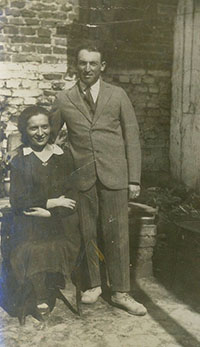Reconnecting with My Past
Growing up, it wasn’t terribly unusual to see people in our house with telltale tattoos on their arms.
We kids somehow knew what those blurry inked numbers meant, but we also knew it wasn’t polite to ask about them. And so, I never did. And honestly, no one in my family had been so marked — the people with tattoos were mostly friends of my grandparents — so it wasn’t something I had a lot of interest in hearing about. And perhaps in an effort to protect our innocence, family elders showed no interest in talking about it.
The Holocaust was mostly an abstraction for me and my cousins growing up in the suburbs. Learning about it wasn’t so different from reading about the Civil War — it was horrible, but also something that happened a long time ago in a world I didn’t understand to people I didn’t know.
While we can trace much of our family to Eastern Europe, our parents were born in Argentina and Mexico. There was some Yiddish bandied about, but discussions in our home were held in Spanish when adults were speaking and English when children were involved.
My grandparents left Eastern Europe for South America a few years before Hitler rose to power. I could hear that they had accents that were different from my parents (whose own accents are different from mine), but stories about the old days were virtually nonexistent.
As far as I knew, nobody in my family had perished in the Holocaust. But then, I never knew that my grandmother had a brother.
His existence came to light long after my grandmother died. So too did the fact that she had lost her entire family in the Holocaust.
My cousin Sharone did some detective work and found not only of his identity, but also a photograph.

His name, we believe, was Yankel Shapiro. The picture shows a dapper man with a friendly face, a mismatched suit and a bad haircut. He’s standing next to a pretty woman, whom I assume is his wife, but that’s only a guess — our sleuthing only got us so far.
The sepia-toned photo makes him seem so distant, so alien. And yet, when I look closer, I begin to wonder. What did he do for a living? What did his laugh sound like? What kind of uncle would he have been?
I wasn’t looking at an obscure piece of history; in a way, I was looking at myself, or what my life could have been if I had been born just a few decades earlier.
I wanted to learn more — more about him, more about my family’s history, more about those folks with the tattoos. But the people I could ask aren’t here anymore. And they took their stories with them.
But if I couldn’t hear their voices, I could hear people who saw what they saw, people who lived in the same town, and people who may have even grown up with them.
There are 75 testimonies in USC Shoah Foundation’s Visual History Archive that mention the town of Plock, Poland, where my family once lived. Those survivor stories aren’t exactly like those of my family, but they give me a glimpse into a past that would have otherwise been closed off to me.
In a piece of testimony, someone’s even says he had a cousin named Yankel Shapiro. Is it the same one? The man who mentioned him lived in a small Polish town a mere 100 miles away from Plock. Is this man a distant relative of mine?
All of my grandparents may be gone, but I can still watch. I can still listen. And I can still learn about some of the things that shaped them into the people I knew.
Like this article? Get our e-newsletter.
Be the first to learn about new articles and personal stories like the one you've just read.